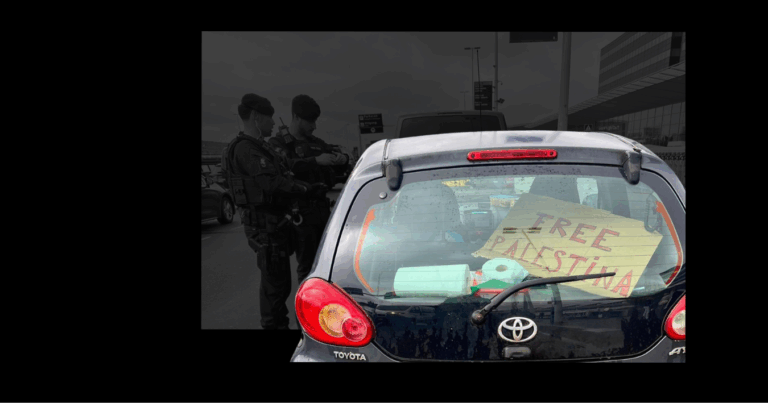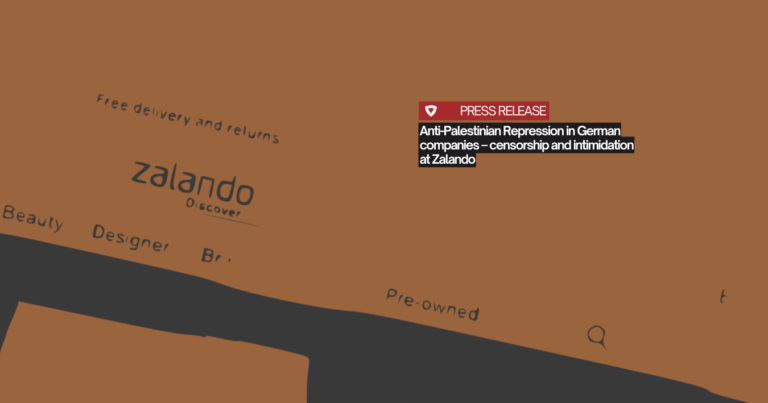German Authorities Separate Baby from Mother Over Palestine Solidarity
Berlin, Germany-Monday 23. June, The European Legal Support Center (ELSC) is challenging a ruling by the Higher Administrative Court Berlin-Brandenburg before the Federal Constitutional Court after German authorities forced a Palestinian-Jordanian mother to separate from her one-year-old son for months, who was initially deemed as a “security threat” in a letter from the German Embassy in Amman.
This case involves the prolonged and seemingly weaponised separation of a young Palestinian family on behalf of the notorious German domestic intelligence service “Verfassungsschutz” (Office for the Protection of the Constitution) in an inhumane and barely legal bureaucratic process. It also highlights how migration laws are being weaponised against activists in Germany to suppress the Palestine solidarity movement and stands as one of the harshest examples of this tactic being employed by the German state especially against Palestinians.
It also exposes the ease with which vague and unsubstantiated security claims can override fundamental rights when targeting Palestinians.
Background:
Background:
B. M. (Name anonymized for security reasons) is a Palestinian mother who holds Jordanian nationality and has been living and working in Frankfurt am Main since 2018 with a valid residency permit. As a professional nurse, her profession is of high demand on the German labor market and German authorities actively invite and encourage such professionals to migrate and work there. She arrived in Germany with residency status as a “skilled worker”.
B.M. is married to a Palestinian man from Jordan who joined her in Germany in 2022 through the family reunification residency. In 2023 the couple received their first child, born in Frankfurt am Main. In October 2023, B.M. applied for permanent residency, and in the meantime, the migration office issued temporary residence permits (Fiktionsbescheinigung) to her and her family. Since her son was born in Germany and the parents had a legal status here, this entitles him to a separate residency status (independent from the family reunification process), a legal right that was conveniently ignored by German authorities in the events to follow.
The beginning of the separation: One year old baby deemed a “security threat” to Germany
In August 2024, a year after their son was born, the family traveled to Jordan for a two-week family visit. Upon attempting to return to Germany, while the temporary residence permits for all family members were still valid, B.M.’s one year old baby was denied boarding as it was declared he lacked the necessary permit to re-enter Germany. German authorities failed to inform the family that re-entering will not be possible for the baby upon departure from Germany, his birthplace.
At the time, the German embassy in Jordan made it seem a mere bureaucratic matter and advised B.M. to stay in Jordan for a few weeks, before her son would receive the required permit.
In November 2024, B.M. received a letter from the embassy stating that her son was not allowed to reenter because there were reasons for refusal according to Section 54(1) no. 2 or 4 of the Residence Act which outline that residence may be refused if an applicant was convicted of one or several criminal acts or had violated residence restrictions or prohibitions and thereby endangered public safety and order. This effectively deemed the baby a “security threat” to Germany, and as such, he would not be allowed to travel with her back to Germany. In the meantime, B.M.’s husband had to travel back for work in Germany, assuming that this “bureaucratic” procedure will be resolved soon and he will welcome them in Frankfurt am Main. He left not knowing that he would not see his child again until returning to Jordan in May 2025.
Highly unusual prolonging of the legal proceedings
After consulting lawyer Ebru Akcan Asiltürk in Frankfurt am Main, another letter was received this time from the migration office in early December 2024, clarifying that the issue was not with her son but in fact with the mother. For the first time, German authorities acknowledged that she was under security investigation by the domestic intelligence service Verfassungsschutz which could potentially result in the revocation of her residency status. The German foreign ministry later argued in court this was because of her alleged involvement with the Palestine solidarity groups/organizations, namely Samidoun Deutschland, Masar Badil und Palestine e.V. This, in turn, would also affect the residency status of both her son and husband. Even though her son has a separate right to residency due to his birthplace in Germany, B.M. was told her son’s entry permit – a simple bureaucratic act and the child’s legal right – was no longer deemed necessary until a final decision on her residency status was made.
B.M.’s lawyer filed an urgent appeal in November 2024 against the German foreign ministry’s decision arguing that:
- A one-year-old cannot constitute a security threat to Germany & the child holds a valid residency status separate from the parent’s reunification residency status
- Both parents hold valid residency permits
- While there might be an ongoing investigation, it has not yet concluded – there are no officially declared security concerns which could justify the separation of the family
- The urgent appeal is necessary because of the financial and legal disadvantages for the family resulting from the arbitrary decision
- German authorities are aiming to prevent the mother from reentering Germany and because there is no legal basis to do so, they are disenfranchising her child
The German foreign ministry in turn gave a remarkable first response:
- The urgent appeal should be dismissed because: “There are no circumstances
- apparent or substantiated that would require the immediate presence of the applicant in Germany.”
- The family of the mother in Jordan could provide care for the child
- The residency permit for the child is dependent on “one involved security agency” and while the child does not constitute a security threat to Germany, allowing the child to enter Germany could possibly constitute a security risk.
An urgent appeal usually results in a preliminary ruling after a few weeks but in this case it took several months, until February 2025. The administrative court in Berlin ruled that reentrance of the child to Germany was not urgent with complete disregard to the legal right of the child to reside in Germany, along with his parents, and the severe impact on the family’s well-being.
B.M. was told to wait for the completion of the security check regarding her permanent residency application. If approved, she would be able to bring her son back to Germany. Her lawyer appealed the decision at the Higher Administrative Court Berlin-Brandenburg with another urgent appeal in February 2025. In the meantime, she also returned to Germany, separating from her child, leaving him behind with her parents to avoid losing her own residency not knowing that the higher court would take another 4 months to decide.
It is noteworthy that it is entirely unclear to the public or even the subject under investigation how such a security check is conducted: neither which authorities are involved apart from the notorious Verfassungsschutz nor on which criteria or information they base their decision and when they are expected to conclude the investigation.
The so-called security check is still ongoing to this day, nearly two years later. This raises questions about whether the Verfassungsschutz has been abusing vague rules to prolong the process and pressure the family into “self-deportation”.
In June 2025 the Higher Administrative Court dismissed the appeal and upheld the previous decision despite the legal flaws, arguing that the parents could move back to Jordan or accept the separation from their child temporarily.
ELSC’s intervention:
The ELSC has now taken the case to the Federal Constitutional Court in an urgent appeal.
ELSC Legal officer Hisham comments: “The German state systematically exploits residence, asylum and citizenship law to punish already marginalised communities. This must be recognised for what it is: a blatantly racist system with devastating consequences. There is no justification for separating a newborn from his parents, yet to label the child a “security threat” marks a grotesque new low, even by their own oppressive standards.”
This shocking, inhumane and politically motivated abuse of bureaucratic power and migration laws is not an isolated case. The ELSC has documented over 22 incidents where threats to residency status or restrictions to freedom of movement were weaponised to repress Palestine solidarity in Germany. More information on our database on anti-Palestinian repression Germany here.
This is just the tip of the iceberg. The true scale is far greater. High ranking German politicians routinely incite migration offices to target Palestine solidarity even for something as minor as social media likes. The German parliament recently urged with overwhelming majority to use all repressive methods at hand in residence, asylum and citizenship law against Palestine solidarity in Germany.
There is an increasing concern that the German domestic intelligence service Verfassungsschutz is highly involved in this process. Its purpose is almost completely unregulated and opaque surveillance of “enemies of the constitution”. The tools at their disposal are increasingly used to target the Palestine solidarity movement in Germany as they openly admit in their latest report.
Germany’s Highest Administrative Court in Leipzig recently ruled to allow deportations to Greece. This affects almost every Palestinian asylum seeker from Gaza in Germany and corresponds with the clear will of the German Government to deport as many people as possible in complete disregard of fundamental human rights. Legal observation suggests that German administrative courts are bending the law in adherence to political pressure.
The ELSC will challenge this case before the constitutional court. Migration laws in Germany are being abused-turning legal residency into a weapon to punish dissent. Now the constitutional court faces its test: will it uphold fundamental rights and stop these unconstitutional and inhumane practices, or will it bend to political pressure.







